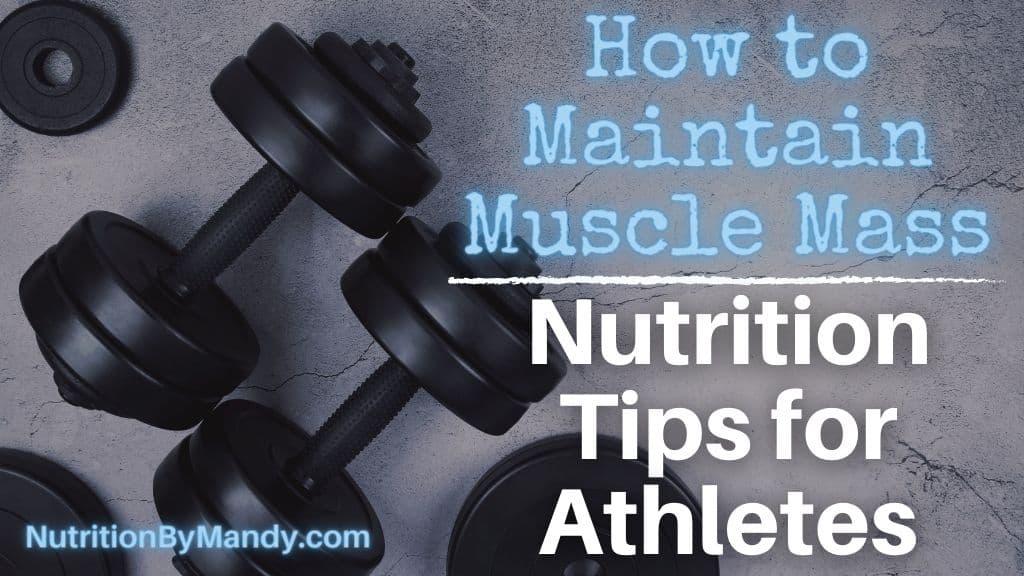Last Updated on June 20, 2025 by Mandy Tyler, M.Ed., RD, CSSD, LD
It is common for athletes to wonder how to maintain muscle mass over the course of a competitive season.
Providing athletes with nutrition tips to support their intense training and game schedules can be key in preventing muscle loss.
How to Maintain Muscle Mass: 7 Nutrition Tips for Athletes
Let’s explore 7 nutrition strategies that can support athletes with fueling their performance and maintaining muscle mass.
Tip #1 Consume Adequate Calories to Support Health and Performance
When athletes are concerned with maintaining muscle mass, protein needs often jump to the forefront of the conversation. However, prior to considering the protein needs of an athlete, it is important to ensure the athlete is consuming adequate calories in their daily diet.
If the athlete is underfueling, and not consuming enough calories to support healthy and daily physical activity, the protein consumed in the diet may be broken down and used for energy (1, 2).
Therefore, athletes first need to make sure they are consuming enough calories in their diet to support their daily energy needs.
This then allows for the protein that the athlete consumes to be utilized for its primary purposes, such as building and repairing muscle mass.

Tip #2 How to Maintain Muscle Mass: Fuel Your Body with Carbohydrates
Similar to gas for a car, carbohydrates provide athletes with fuel to run on. Unfortunately, a nutrition mistake I see athletes commonly make is consuming inadequate amounts of carbohydrates to fuel their high level of activity.
Athletes can get carbohydrates in the diet from a variety of sources, including:
- Fruit: Fresh, frozen, dried, canned in natural juices, applesauce
- Grains: Bread, rice, pasta, cereal, oatmeal
- Starchy vegetables: Potatoes, sweet potatoes, corn, winter squash, peas, beans, and legumes
- Dairy: Milk and yogurt
Carbohydrate Needs of Athletes
The carbohydrate needs of athletes vary based upon both the intensity and duration of activity the athlete is engaged in (3).
On days when athletes will be exercising more intensely or for a longer duration, they should increase the amount of carbohydrates in their meal plan.
Pro Tip: On intense workout days, athletes should fill half of their plate with carbohydrate-rich foods such as rice, pasta, potatoes, and fruit.
Tip #3 Prioritize Protein Intake to Maintain Muscle Mass
In addition to adequate calories and carbohydrates to fuel their workouts, it is important to ensure athletes are meeting their daily protein needs.
How Much Protein to Maintain Muscle Mass?
A daily intake of 1.4-2.0 g/kg/day is frequently suggested for athletes looking to build and maintain lean muscle mass (4). For a 165-pound athlete, this calculates to be in the range of 105-150 grams of protein per day.
In general, I find most athletes consume an adequate amount of protein in their meal plans. However, an area many athletes can improve on is the distribution of their protein intake throughout the day.
Spread Protein Throughout the Day
To optimally support the building and maintenance of muscle mass, athletes should aim to eat ~0.25-0.3 grams of protein per kg of body weight with meals and snacks spaced throughout the day (3, 4). This calculates to be in the range of 20-40 grams of protein per meal or snack, with larger athletes needing more protein than smaller athletes.
In addition, athletes should include protein in their post-workout meal to support their recovery nutrition needs.

What About Protein Powders to Maintain Muscle Mass?
A question I frequently receive from athletes is whether or not a protein powder is necessary for supporting them with maintaining muscle mass.
Protein powders can be a convenient way for athletes to meet their protein needs when time is limited. However, protein powder should not take the place of real food in the diet.
Athletes should focus on eating real food to build the foundation of their sports nutrition meal plans. The use of protein powders should be saved for those situations when time is limited and a quick option is needed.
Choose Third-Party Tested Supplements
In addition, athletes need to understand that sports supplements, including protein powders, are not regulated by the Food and Drug Administration in the same was that food is. Dietary supplements may contain banned substances that could potentially make athletes ineligible for competition (5).
Athletes should choose supplements that have been third-party tested for banned substances. When a supplement is third-party tested, it has been evaluated by an outside organization for accuracy of ingredients.
Two companies that evaluate and certify sports supplements are Informed Sport and NSF International Certified for Sport.
Pro Tip: Make sure to review my blog on key considerations for selecting the best protein powder, prior to purchasing a supplement for use.
Tip #4 Eat Frequently Throughout the Day to Maintain Muscle Mass
When athletes are struggling to maintain muscle mass, it can be helpful to work with them on developing a consistent schedule for fueling throughout the day.
I like to encourage athletes to aim to consume 3 meals and 3 snacks each day. Athletes who find they forget to eat during the day may consider setting an alarm on their smartphone as a reminder to eat.
Plan Healthy Snacks
Eating balanced snacks throughout the day can support athletes with meeting their sports nutrition needs. Well-planned snacks can help boost an athlete’s total daily calorie intake and help fill nutrient gaps in their meal plan.
Athletes should view their snacks as “mini-meals” that are an important part of their overall diet. To create a balanced snack or “mini-meal” athletes should aim to combine a carbohydrate-rich food item with a food providing protein.
Healthy snack ideas for athletes include:
- Turkey and cheese wrap
- Peanut butter and jelly on honey wheat bread
- String cheese with fig bars
- Hard-boiled eggs with grapes
- Cottage cheese with pineapple
- Granola bars with nut butter
- Hummus with pita chips
- Trail mix made with pretzels, whole grain cereal, dried fruits, and nuts
With busy weekday schedules, athletes should take time to meal prep their snacks in advance. This will help to ensure that they have nutritious options available to support their nutrition needs throughout the week.

Tip #5 How to Maintain Muscle Mass: Fuel Your Workouts
If athletes want to get in a high-quality workout, it is important they go into their workouts well fueled to train and perform at their best.
In general, the amount and type of food that athletes should eat before a workout depends on how much time they have prior to the start of the activity.
Pre-Workout Meals for Athletes
When athletes have 3-4 hours before the start of their workout, they can plan to eat a meal that contains a good source of carbohydrates as well as a moderate amount of protein.
Example pre-workout meals that athletes can enjoy include:
- Pancakes with sliced banana and scrambled eggs
- Fruit smoothie, bagel with nut butter
- Grilled chicken sandwich, baked chips, apple slices, low-fat milk
- Pasta with marinara (tomato sauce), grilled chicken, and vegetables, breadsticks
- Grilled salmon, steamed rice, green beans, dinner rolls
Pre-Workout Snacks for Athletes
When athletes have less time before the activity, they should focus on eating an easy-to-digest high-carb snack.
Snack ideas that athletes can consume in the hour or two before a workout include:
- Banana or small piece of fresh fruit
- Applesauce, dried fruit, fruit leather
- Pretzels, pita chips
- Dry breakfast cereal, graham crackers, animal crackers
- Bagel, fig bar, low-fat granola bar
- Sports drink, chews, gel
Tip # 6: How to Maintain Muscle Mass: Focus on Recovery Nutrition
During the season, recovery nutrition is one area I encourage athletes to capitalize on. With demanding in-season training and competition schedules, it is important athletes prioritize nutrition between activities to support their recovery.
The three key nutrition concepts athletes should keep in mind with regard to recovery nutrition include:
- Rehydrate: Replace fluid and electrolytes lost in sweat
- Refuel: Refill energy stores with carbohydrates
- Repair: Consume protein to build and repair muscles

Recovery Nutrition Snack Ideas
Following a workout, athletes should have a plan for snacks they can enjoy that support their recovery nutrition needs. This is especially important if it will be several hours until their next meal.
Easy recovery nutrition snack ideas include:
- Low-fat chocolate milk and granola bars
- Peanut butter and jelly sandwich with low-fat milk
- Greek yogurt, berries, and granola
- Beef jerky, pretzels, banana, sports drink
- String cheese, sliced ham, crackers, grapes, water
- Sports bar with sports drink
- Post-workout smoothie
Pro Tip: Athletes following a plant-based diet can find a variety of recovery nutrition snack ideas in my blog on vegetarian post-workout snacks.
Recovery Nutrition Meal Ideas
When possible, athletes should then aim to follow-up their recovery nutrition snack with a well-balanced meal within the next couple of hours.
Ideas for post-game meals include:
- Pasta with lean meat sauce, salad, breadsticks, low-fat milk
- Turkey sub sandwich, pretzels, grapes, sports drink
- Roasted chicken breast, brown rice, green beans, fresh berries, 100% fruit juice
- Grilled salmon, baked sweet potato, steamed broccoli, sliced melon, dinner rolls, tart cherry juice
- Chipotle Burrito Bowl: Grilled chicken or steak, rice, black beans, corn salsa, tomatoes, lettuce, side tortilla
- Chick-fil-A: Grilled chicken wrap, Greek yogurt parfait, fresh fruit cup
- CAVA Bowl: Grilled chicken, brown rice, SuperGreens, veggie toppings, hummus, and pita chips
Tip #7: Enjoy a Protein-Rich Evening Snack to Maintain Muscle Mass
One final nutrition tip to support athletes with maintaining muscle mass is including a high-protein evening snack in their meal plan.
I often tell athletes that a protein-rich evening snack is their secret weapon for maintaining muscle mass throughout the course of a season.
During sleep the body recovers from the activities of the day. Consuming protein before going to bed can help promote muscle protein synthesis during the overnight recovery period (4, 6).
I encourage athletes to try and consume their evening snack in the hour before going to bed. Athletes should aim to consume ~40 grams of protein with their pre-sleep snack (4, 6).
Protein-Rich Evening Smoothie
A protein-rich, high-calorie smoothie can be a nutritious evening snack option. There are numerous ways athletes can add protein to their shakes with real food items.
Consider the ideas below to increase the protein content of an evening smoothie.
- High-protein milk
- Greek yogurt
- Cottage cheese
- Tofu
- Soy Milk
- Nut butters
- Chia and flaxseeds
How to Maintain Muscle Mass: 7 Nutrition Tips for Athletes
You are now set with a variety of nutrition tips to support athletes with maintaining muscle mass throughout the course of a season.
For additional sports nutrition tips for athletes, check out my blog on off-season nutrition.
Join the Nutrition By Mandy Email List & Get a Free High Calorie Smoothie Recipe
Click HERE to join the Nutrition By Mandy e-mail list. When you join you will receive a free high calorie smoothie recipe to download and enjoy.
About the Author
Mandy Tyler is a Sports Dietitian Nutritionist in the San Antonio, TX area. She is a Registered and Licensed Dietitian, a Board-Certified Specialist in Sports Dietetics, a Licensed Athletic Trainer, and is a Certified Exercise Physiologist through the American College of Sports Medicine. Mandy has experience working with athletes at the high school, collegiate, and professional levels. She believes the key to reaching one’s full potential, both in everyday life and in sports performance, relies on a healthy nutritional foundation.

If you are looking to take your performance to the next level, make sure to check out my new Sports Nutrition Game Day Guide. This downloadable guide is written to help athletes develop an individualized plan to achieve peak performance on game day.





